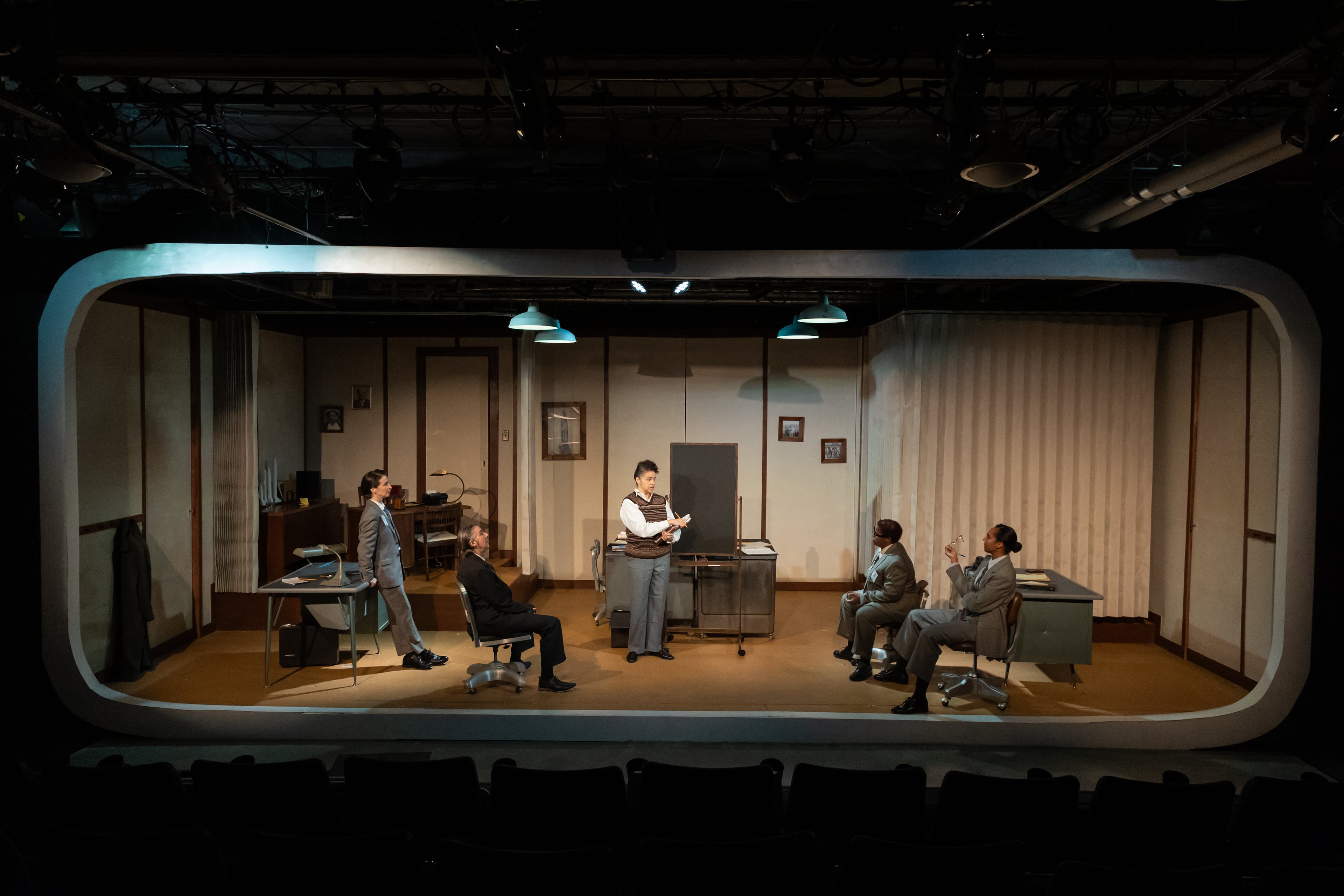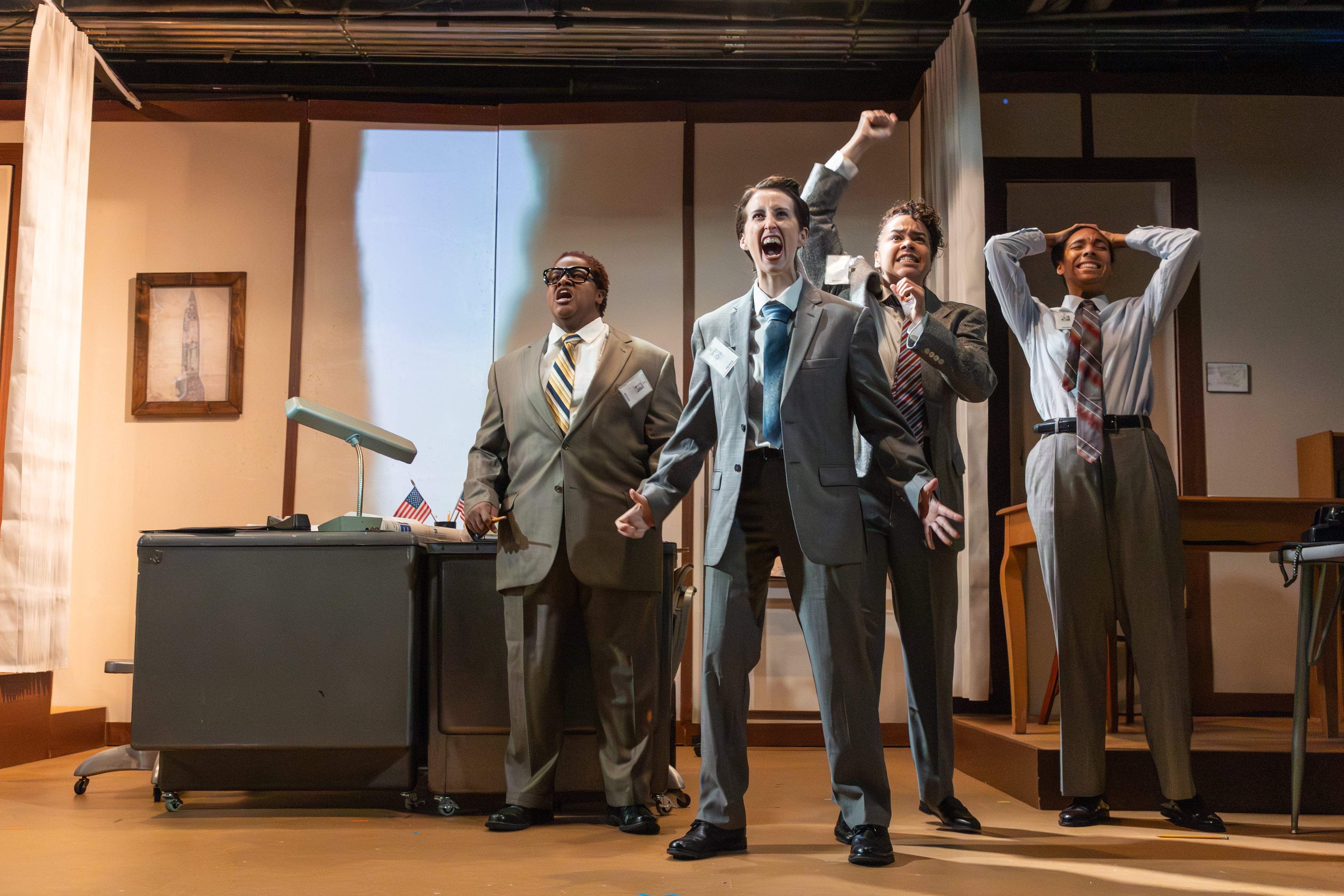‘The Rocket Men’ unravels Nazi history behind U.S. space program

In February 1958, when rocket scientist Wernher von Braun appeared on the cover of Time magazine with a missile launching behind him, he was hailed as the visionary leading America into the Space Age and helping the nation outpace the Soviet Union.
A few years earlier, in 1955 — the same year Disneyland opened its futuristic attraction Tomorrowland — von Braun had starred in a Walt Disney’s television special “Man in Space,” helping to popularize the once-fantastical dream of space travel.
But von Braun had a darker history, one largely obscured from the American public by the U.S. government and military agencies.
Discovering that history was the catalyst that compelled New York-based playwright Crystal Skillman to write the script for “The Rocket Men,” onstage at Atlanta’s Synchronicity Theatre through Nov. 2 as part of a three-stage rolling world premiere through the National New Play Network.

Von Braun, Skillman discovered, was a former Nazi scientist. Although the public knew he had worked for Germany during World War II (a truth revealed by the New York Times in 1946), few understood the full extent of his complicity in Nazi crimes against humanity.
Von Braun, who had risen the ranks to SS-Sturmbannführer (a Nazi major), had, unbeknownst to the American public, overseen the production of V-2 rockets built with slave labor at the Mittelbau-Dora concentration camp where roughly 20,000 died in brutal underground factories. After one revolt, some were hanged from the rocket platforms where they had been forced to work.
Von Braun, Mittelbau-Dora operations director Arthur Rudolph and other members of their core team in Nazi Germany were brought to the U.S. in 1946 by then-President Harry S. Truman as part of Operation Paperclip, a secret U.S. military program that recruited more than 1,600 former Nazis to aid postwar defense and space efforts. The program was named after the paper clips that denoted the personnel files of promising scientists the U.S. wanted to recruit after World War II.
Skillman learned pieces of this history in 2018 while visiting Huntsville, Alabama — aka Rocket City — to oversee the production of one of her plays, “Geek!” One day, she broke free from the theater to play tourist and visit the U.S. Space & Rocket Center.
In the gift shop she stumbled across a book titled, “The Rocket Team,” written by a space historian who had worked with von Braun. In it, there were several chapters dedicated to research on the Dora-Mittelbau rocket factory.
But those chapters “were written so dry and technical, they were much more about the achievements and what became the space program,” Skillman recalled.
She was unsatisfied.
“I was like, ‘Wait a minute, no one is actually bearing this history in an interesting way,’” she said.
Her curiosity, aided by ample time during the pandemic, propelled her down a rabbit hole for several years — reading multiple books, digging through archives, watching documentary films and uncovering the difficult truths that laid the foundation for America’s space program.
With her research she set out to write a script that could both illuminate some of von Braun’s and Dora-Mittelbau’s uglier history, while also humanizing the characters and presenting ethically complex questions.
The result was “The Rocket Men.” Her research has been incorporated both into the script and into a robust website created to supplement the play.
Directed by Synchronicity Theatre co-founder Rachel May, “The Rocket Men” centers on von Braun’s (Amelia Fischer) team of six scientists and engineers working at Huntsville’s Redstone Arsenal as part of the Army Ballistic Missile Agency, which later became NASA.
The protagonist in this dramatized nonfiction, however, is not von Braun. The play, Skillman noted, is not “a hero’s journey.” The protagonist rather is Heinz-Hermann Koelle (Laura Boston Edwards).
Unlike the other German scientists, Koelle joins von Braun’s team in Huntsville as an outsider, not part of the original core team. Thirteen years younger than von Braun, Koelle largely idolizes his mentor’s brilliance. He is eager to build rockets that could potentially take astronauts to other planets. He helps von Braun publish his book “The Mars Project,” which proposes the utopian idea the red planet holds the key to ending nationalism, inequality and war. Interplanetary exploration, von Braun wrote in the book, could “lift mankind to a higher moral plane” and create world peace.

Koelle’s idealism is challenged, however, when he is approached by a Jewish-American engineer, Sol Weissman, who tells him about von Braun’s history. Weissman, it turns out, was in the Army during World War II and helped liberate Mittelbau-Dora. He witnessed the atrocities committed at the labor camp.
Koelle is forced into a crisis of conscience. Does he let the past stay in the past in the name of scientific progress? Or does he confront the unpalatable secrets lurking in von Braun’s shadow?
All six of the so-called “rocket men” in Skillman’s script are paradoxically played by women. Theatergoers come to fully understand this strategic choice only in the last quarter of the play, when Skillman reveals one last big truth.
The play is designed to peel back layers, each one exposing deeper levels of revelation, each building to one last grand reveal.
The reveal arguably comes late, leaving little hurried time to explore the last jarring truth. In doing so, Skillman repeats the same phenomenon her play demonstrates history does: It gives the most time, voice, power and story to the men, rather than the voiceless parties who finally get a spotlight at the very end. Nevertheless, Skillman does uncover a truth long left out of the history books.
Even before Skillman’s rationale in casting all women comes to full light, the technique has the noticeable effect of somehow softening the former Nazi scientists. Skillman is talented at capturing the men beyond their German roots or science-attuned brains by incorporating scenes about their love for their wives and children.
She also skillfully portrays the Germans’ efforts to assimilate to the American way of life. In one tender scene, von Braun and Koelle admire Alabama’s natural beauty while floating aboard a fishing boat and drinking cold bottles of Budweiser.
The German point of view offers Skillman a unique way to reflect America’s hypocrisy; for example, showing the Germans’ ability to become equal American citizens at the same time Black people were segregated to a “colored” library; or showing the nation’s disdain for World War II, while also sending troops to fight in Vietnam. Such inconsistent values feel sharper when pointed out by former Nazis.
The play undoubtedly illuminates the gray zones between black and white. These complicated ambiguities are one quality that drew May — the granddaughter of a Jewish, Yugoslavian Holocaust survivor — to pursue staging the play.
“I love stories that invite you to grapple with multifaceted, nuanced ways of looking at a point in history or a subject,” she said. “This play does that. … It really invites you to wrestle with the notion of complicity and wrestle with the notion of cost in the face of progress. … It’s not simple, because history is not simple.”
“The Rocket Men” doesn’t resolve history so much as reopen it. Whose history gets told and whose is hidden? It is a question as resonant today as it was then.
IF YOU GO
“The Rocket Men”
Through Nov. 2 at Synchronicity Theatre. 8 p.m. Wednesdays-Saturdays, 5 p.m. Sundays. General admission tickets range $25-$45. Limited discounted $10 tickets available at each performance. Peachtree Pointe, 1545 Peachtree St., Atlanta. 404-484-8636, synchrotheatre.com.



